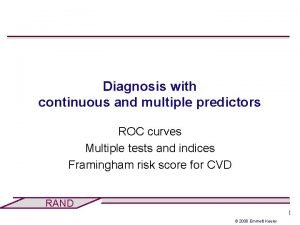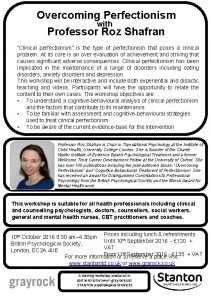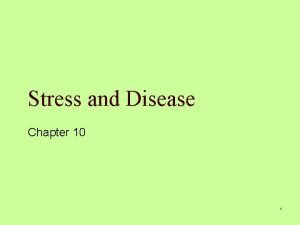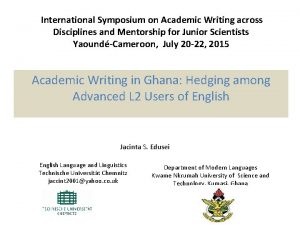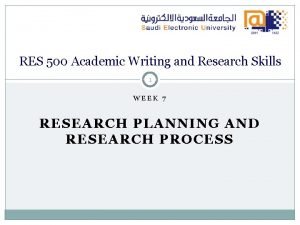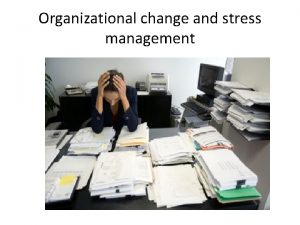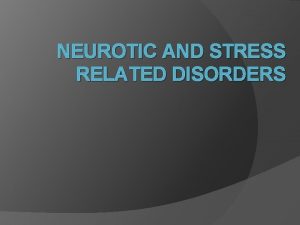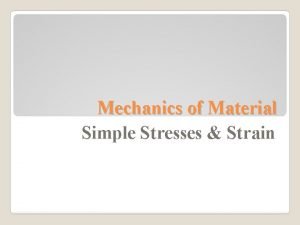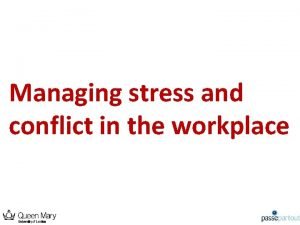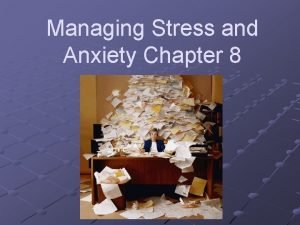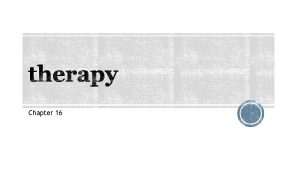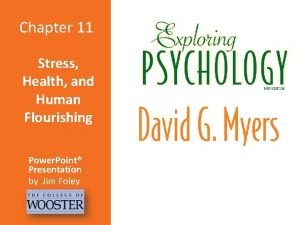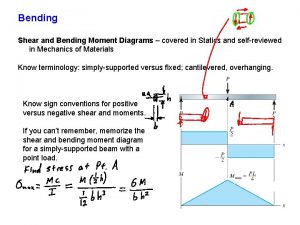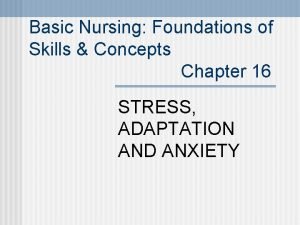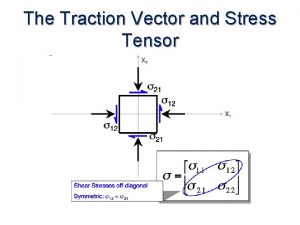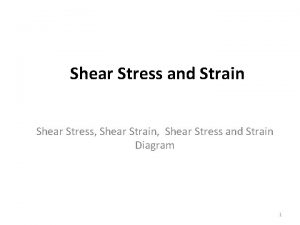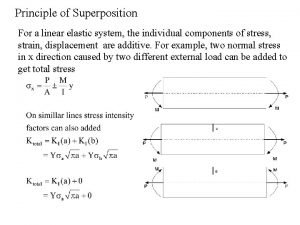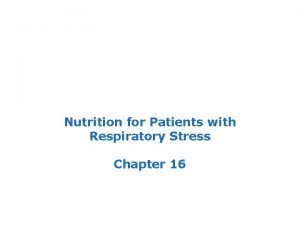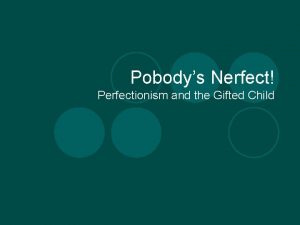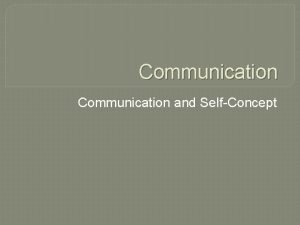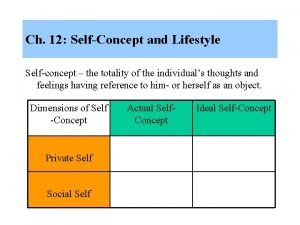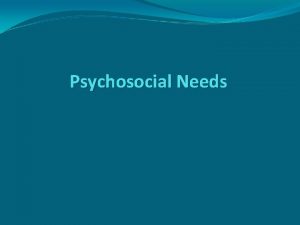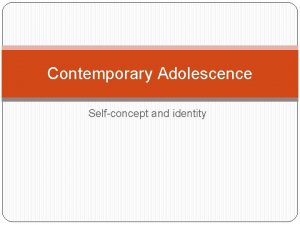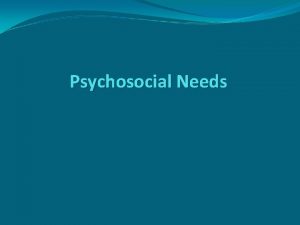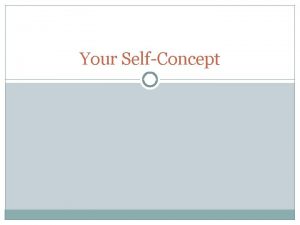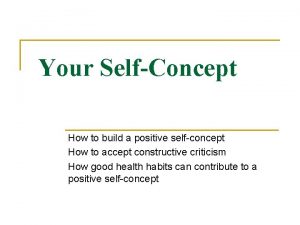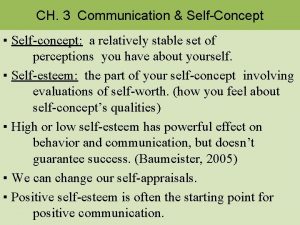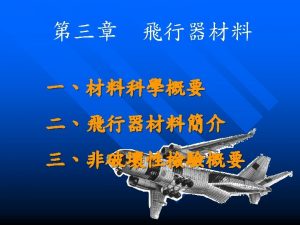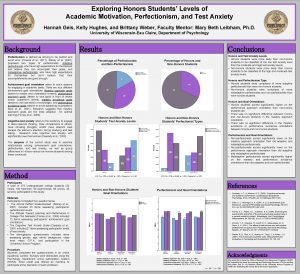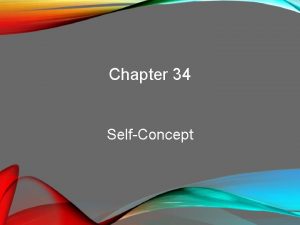PERFECTIONISM AND ACADEMIC SELFCONCEPT AS PREDICTORS OF STRESS






























- Slides: 30

PERFECTIONISM AND ACADEMIC SELFCONCEPT AS PREDICTORS OF STRESS IN PRE-MEDICAL STUDENTS Ms. Humaira Akhtar Institute of Applied Psychology, University of the Punjab, Lahore Ms. Sara Asad (Lecturer) Department of Applied Psychology, Kinnaird College for Women, Lahore

INTRODUCTION Curriculum of pre-medical is designed to certify that each student is professional, skilled, and knowledgeable but stress may prevent the development of these characteristics among students. Almost 20% of first year Pakistani medical students report higher academic stress which negatively affects their academic performance (Sohail, 2013). This study aimed to investigate the sources of academic stressors in premedical students.

Perfectionism may be a particularly relevant personality characteristic to study in pre-medical students. Faultless performance, meticulous attention to detail and high levels of competency generally represent desirable characteristics of pre-medical students, yet students with excessively high standards may have difficulty completing assignments and may experience extra self-imposed pressure (Humphris & Kanney, 1998).

Perfectionism is conceptualized as a multidimensional construct i. e. , it has both positive and negative dimensions. Empirical evidence has suggested that adaptive perfectionism, such as personal standards and organization, is associated with adaptive coping, high academic achievement, and conscientiousness, whereas, maladaptive perfectionism such as excessive concern for mistakes, doubt about actions, and parental criticism has been linked with negative psychological outcomes i. e. , depression, anger, and anxiety (Black & Reynolds, 2013; Schiena, Luminet, Philippot, & Douilliez, 2012; Smith, Saklofske, Yan, & Sherry, 2015).

Shavelson and Bolus (1982) proposed that academic self-concept refers to students' perception of their academic abilities influenced by institutional experiences. Self-enhancement model proposed that prior self-concept strongly predicts later academic success (Marsh & Craven, 2006). Negative interpretation of one’s own ability, capabilities, motivation and academic performance can predict lower academic achievement among students (Sahu, Jha, & Pandey, 2016).

This study can derive support from theory of Big Fish Little Pond Effect model which argues that students contrast their personal ability with the academic ability of their class mates and use this social comparison impression as the root forming their own academic self-concept (Marsh et al. , 2008). Pre-medical students are usually high ability students but their academic self-concept might be threatened when they find themselves in institutions where majority of the students are now high achievers and this might induce stress in them.

Stress as defined by noted researcher Lazarus (2006) is a state of anxiety produced when events and responsibilities exceed from one’s coping abilities. Academic stress is particularly relevant to the academic arena where students are increasingly being expected to cope with larger workloads which lead to an increase in self-doubt with regard to their aptitude (Carveth, Geese, & Moss, 1996). Academic related stressors can result into health related or psychological problem for students (Misra & Mc. Keen, 2000).

While sources of academic stress have been extensively studied among medical students, no published empirical research to our knowledge has investigated how perfectionism and academic self-concept together relate to academic stress among pre-medical students in Pakistani academic settings. This study is a step to address this gap in the literature.

OBJECTIVES 1. 2. To find a relationship of perfectionism and academic self-concept with stress in pre-medical students. To identify the role of perfectionism and academic self-concept as predictors of stress in pre-medical students.

HYPOTHESES 1. 2. 3. Perfectionism is likely to have a significant relationship with stress in pre-medical students. Academic self-concept is likely to have a significant relationship with stress in pre-medical students. Perfectionism and academic self-concept are likely to predict stress in pre-medical students.

METHOD Research Design Correlational research design was used. Sample and Sampling Strategy Non-probability purposive sampling strategy was used to select 200 pre-medical students (boys = 100; girls = 100) aged 16 -19 years from different government colleges of Lahore. Those intermediate students with major subjects other than pre-medical were excluded from the study.


Instruments Demographic information sheet designed by researchers included questions regarding participants' age, gender, percentage of marks obtained in previous exam, and religion. Multidimensional Perfectionism Scale (MPS; Frost, Marten, Lahart, & Rosenblate, 1990) includes 35 items. Each item is scored on a 5 point Likert scale ranging from 1 (strongly disagree) to 5 (strongly agree). It has six subscales: Concern over Mistakes (CM; 9 items), Doubts about Actions (DA; 4 items), Parental Criticism (PC; 4 items), Parental Expectations (PE; 5 items), Personal Standards (PS; 6 items), and Organization (OR; 6 items). Subscales of CM, DA, PC, and PE are characterized as maladaptive, and those of PS and OR as adaptive. For present study, internal consistency alpha value of MPS was reported as. 80 and Urdu translation of MPS was used in present research.

The Original Academic Self Concept Scale (Liu, Wang, & Parkins, 2005) was used to measure academic self-concept of pre-medical students. It consists of 19 items and has two sub scales: Academic Confidence (9 items) and Academic Effort (10 items). Participants were requested to rate each item on fivepoint Likert scale ranging from 1 (Strongly Disagree) to 5 (Strongly Agree). The computed cronbach alpha value for the overall scale was. 60 indicative of its good reliability. Researchers used standard forward and backward translation method to translate this scale in Urdu. Academic stress in pre-medical students was measured by Educational Stress Scale for Adolescents (ESSA; Sun, Dunne, Hou, & Xu, 2011). This instrument contains 16 items measuring five factors of academic stress that is Pressure from Study (14 items), Study Workload (3 items), Self Expectation Stress (3 items), Worry about Grades (3 items) and Study Despondency (3 items). Participants are requested to rate each item on five-point Likert scale ranging from 1 (Strongly Disagree) to 5 (Strongly Agree) with higher scores indicating greater academic stress. Present researchers computed cronbach alpha value for overall 16 items of ESSA scale as. 80. Urdu version of ESSA was used in the present research.

Procedure First, permission was sought from the authors of the instruments to be used in the research. Urdu version of assessment measures was used after obtaining formal permission from respective authors. The Original Academic Self-Concept scale was translated in Urdu through backward translation method and pilot study was conducted to determine appropriateness of the tool for target population. In the next step, data was conveniently collected from Forman Christian College (n = 50), Lahore College for Women (n = 50), Government College Township for boys (n = 50), and Government College Township for girls (n = 50) after taking formal permission from concerned authorities. Before collecting data, written consent was taken from those research participants who fulfilled inclusion criteria. They were briefed about the nature and purpose of the study. Participants were ensured about the privacy of information. Individual administrations of the questionnaires were done.

RESULTS Statistical Package for Social Sciences (version 21) was used to analyse the results. Descriptive statistics was used to determine the demographic characteristics of sample. Pearson Product Moment Correlation Coefficient and Multiple Hierarchical Linear Regression Analyses were computed to test assumptions.


Perfectionism subscale of concern over mistakes had significant positive relationship with worry about grades. This suggests that pre-medical students who showed higher concern over mistakes worried more about their academic grades. Personal Standards dimension was negatively related with study workload suggesting that pre-medical students who had higher personal standards were less likely to perceive study workload. A significant positive relationship was found between parental criticism and pressure from study, self-expectation stress, and study despondency indicating that pre-medical students who perceived their parents as highly critical were more likely to take pressure from their study, view themselves critically, and be hopeless about their study efforts. Similarly, doubts about action had significant positive relationship with pressure from study, worry about grades, self-expectation stress, and study despondency. Organization had significant negative relationship with study workload, selfexpectation stress, and study despondency reflecting that pre-medical students who emphasized on organization were less likely to perceive study workload, criticize themselves, and show hopelessness regarding their study efforts. Academic self-concept did not relate significantly with either of the dimensions of academic stress.


Doubt about actions emerged as significant predictor of pressure from study suggesting that pre-medical students who frequently doubted about their actions took more pressure of study. Academic effort significantly predicted for study workload suggesting that pre-medical students who put more efforts in their studies were more likely to perceive burden about their home works and examinations etc. Concern over mistakes and doubt about actions emerged as positive while organization turned out negative predictor of worry about grades implying that pre-medical students who showed higher concern over mistakes and doubted their academic endeavors worried more about their grades while pre-medical students who had high preference for order worried less about their academic grades. Parental criticism was the positive while organization was the negative predictor of self-expectation stress. Study despondency was positively predicted by parental criticism and doubts about action was negatively predicted by organization.

Pressure from Study • Doubt about Actions (Positive Predictor) • Academic Effort (Positive Predictor) Study Workload Worry about Grades Self-expectation Stress Study Despondency • Concern over Mistakes and Doubt about Actions (Positive Predictor) • Organization (Negative Predictor) • Parental Criticism and Doubt about Actions (Positive Predictor) • Organization (Negative Predictor)

DISCUSSION First hypothesis of the study was confirmed as dimensions of perfectionism had significant relationship with academic stress in pre-medical students. Researchers also found that excessive concern over mistakes correlates with increased stress and decreased mental health of the students. Moreover, students who excessively doubt about their abilities do not engage themselves in challenging experiences and they don't get to discover their true potential which may reduce in them the sense of playfulness, creativity, motivation, and the assimilation of knowledge. This doubting of actions may become a steady source of negative emotions and stress rather than reaching toward something positive. Pressure on children to achieve academically is also rampant, because parents now seek much of their status from the performance of their children; parents' excessive criticism can put children under stress and leave them worrying about their academic performance (Rice, Choi, Zhang, Morero, & Anderson, 2012).

Similar to present research findings, past research work (Black & Reynolds, 2013; Wang, Slaney, & Rice, 2007) also indicated that two dimensions of perfectionism i. e. , personal standards (setting high standards for self-evaluation) and organization (importance is placed on orderliness) decrease the rate of negative psychological outcomes like academic burnout, low self-esteem, anxiety and depression.

Contrary to set prediction, academic selfconcept did not relate significantly with academic stress in pre-medical students. It is to be duly noted that both first and second year pre-medical students were considered for this study. It is possible that first year pre-medical students were still feeling the glory of being selected into pre-medical area at the time of data collection since their self-evaluations were not affected by first year grades yet and they may not have had the first hand experience of the potential repercussions of studying with a group of high ability students. This factor may have made the relationship between two variables insignificant.

In present study, academic stress in pre-medical students was predicted by multiple dimensions of perfectionism and academic effort after controlling for the effect of covariates. Students’ feeling more doubtful about their actions and being more concerned about their mistakes perceive greater study pressure and keep worrying about their grades. Cultural stereotypes cannot be ignored while interpreting the results of this study. Scholastic achievement is considered a family obligation in many south Asian countries and parents likewise expect children to exhibit higher educational attainments and show intolerance towards children educational disappointments which ultimately put students in unnecessary stress. Students feel persistent pressure to achieve landmark educational goals set for them by their significant others due to which despite their best academic effort, they feel overwhelmed by course syllabus and have fear of failure (Yoon & Lau, 2008).

In this study, adaptive aspect of perfectionism such as “organization” lowered the risk of academic stress in pre-medical students. Literature (Ranjita & Michelle, 2000; Stoeber & Janssen, 2011) also highlights that adaptive perfectionists striving and practical implementation of effective time management strategies enhance academic performance and reduce academic stress in students.

LIMITATIONS & SUGGESTIONS This study had several limitations. Since sample was drawn from Lahore so it was not representative of all the other cities of Pakistan. It is suggested to include other cities to get larger and more representative sample of pre-medical students in future validation studies. This study was correlational in nature so it cannot provide evidence for a causal relationship among study variables. Future researchers are encouraged to control above mentioned confounding and replicate this study with definitive research designs such as longitudinal or experimental designs.

CONCLUSION This study is significant in a way that it allowed researchers to confirm the predictive role of maladaptive aspects of perfectionism and academic self-concept in producing academic stress among premedical students. Stress management strategies must be incorporated into medical education to ensure the output of effective doctors. Actions need to be taken to encourage under stress pre-medical students to seek psychological help.

REFERENCES Sohail, N. (2013). Stress and academic performance among medical students. Journal of College of Physicians & Surgeons Pakistan, 23(1), 67 -71. Black, J. , & Reynolds, W. M. (2013). Examining the relationship of perfectionism, depression, and optimism: Testing for mediation and moderation. Personality & Individual Differences, 54(3), 426 -431. doi: 10. 1016/j. paid. 2012. 10. 012 Schiena, R. D. , Luminet, O. , Philippot, P. , & Douilliez, C (2012). Adaptive and maladaptive perfectionism in depression: Preliminary evidence on the role of adaptive and maladaptive rumination. Personality & Individual Differences, 53(6), 774 -778. doi: 10. 1016/j. paid. 2012. 05. 017 Smith, M. M. , Saklofske, D. H. , Yan, G. , & Sherry, S. B (2015). Perfectionistic strivings and perfectionistic concerns interact to predict negative emotionality: Support for the tripartite model of perfectionism in Canadian and Chinese university students. Personality & Individual Differences, 81, 141 -147. doi: 10. 1016/j. paid. 2014. 09. 006 Shavelson, R. J. , & Bolus, R. (1982). The interplay of theory and methods. Journal of Educational Psychology, 74(1), 3 -17. Marsh, H. W. , & Craven, R. (2006). Reciprocal effects of self-concept and performance from a multidimensional perspective. Perspectives on Psychological Science, 1, 95– 180. Liu, W. C. , Wang, C. K. , & Parkins, E. J. (2005). A longitudinal study of students’ academic self-concept in a streamed setting: the Singapore context. British Journal of Educational Psychology, 75(4), 567 -586.

Sahu, L. , Jha, M. , & Pandey, D. (2016). Self-concept and academic stress among boys and girls students. Indian Journal of Health and Wellbeing, 7(5), 540 -542. Carveth, J. A. , Gesse, T. , & Moss, N. (1996). Survival strategies for nurse midwifery students. Journal of Nurse Midwifery, 41, 50 -54. Lazarus, R. S. (2006). Stress and emotion: A new synthesis. New York: Springer Publishing Company. Marsh, H. , Seaton, M. , Trautwein, U. , Lüdtke, O. , Hau, K. , O'Mara, A. , & Craven, R. (2008). The big-fish-little-pond-effect stands up to critical scrutiny: Implications for theory, methodology, and future research. Educational Psychology Review, 20, 319 -50. 1007/s 10648 -0089075 -6. Misra, R. , & Mc. Kean, M. (2000). College students’ academic stress and its relation to their anxiety, time management, and leisure satisfaction. American Journal of Health Studies, 16(1), 41 -51. Humphris, G. , & Kaney, S. (1998). The encouragement of `perfect' health professionals. Medical Education, 32, 452 -5. Frost, R. O. , Marten, P. , Lahart, C. , & Rosenblate, R. (1990). The dimensions of perfectionism. Cognitive Therapy & Research, 14(5), 449 -468. Sun, J. , Dunne, M. P. , Hou, X. , & Xu, A. (2011). Educational stress scale for adolescents: Development, validity, and reliability with Chinese students. Journal of Psychoeducational Assessment, 29(6), 534 -546.
 Roc curve with multiple predictors
Roc curve with multiple predictors Roz shafran
Roz shafran Core quadrant example
Core quadrant example True fracture strain
True fracture strain Chapter 10 stress responses and stress management
Chapter 10 stress responses and stress management Normal stress vs axial stress
Normal stress vs axial stress Pretest: developing an academic and career plan
Pretest: developing an academic and career plan Differentiate formal writing from technical writing
Differentiate formal writing from technical writing Generic elective academic writing and composition
Generic elective academic writing and composition Academic english reading and writing across the disciplines
Academic english reading and writing across the disciplines Academic writing and research skills
Academic writing and research skills Scholarly publishing and academic resources coalition
Scholarly publishing and academic resources coalition Change and stress management
Change and stress management Stress strain curve
Stress strain curve Neurosis disorder
Neurosis disorder Stress on an object
Stress on an object Stress curve and phases
Stress curve and phases Stress and conflict introduction
Stress and conflict introduction Chapter 8 managing stress and anxiety
Chapter 8 managing stress and anxiety Design philosophy of steel structure
Design philosophy of steel structure Chapter 4 managing stress and coping with loss notes
Chapter 4 managing stress and coping with loss notes Chapter 18 organizational change and stress management
Chapter 18 organizational change and stress management Psychoanalytic vs humanistic
Psychoanalytic vs humanistic Stress health and human flourishing
Stress health and human flourishing Bending moment diagram
Bending moment diagram Stress and adaptation fundamentals of nursing
Stress and adaptation fundamentals of nursing St venant's principle stress and strain diagram
St venant's principle stress and strain diagram Traction vector from stress tensor
Traction vector from stress tensor Stress strain
Stress strain Principle of superposition in stress and strain
Principle of superposition in stress and strain Respiratory stress
Respiratory stress
